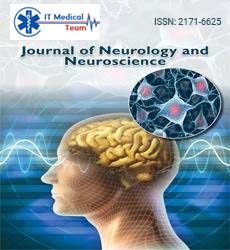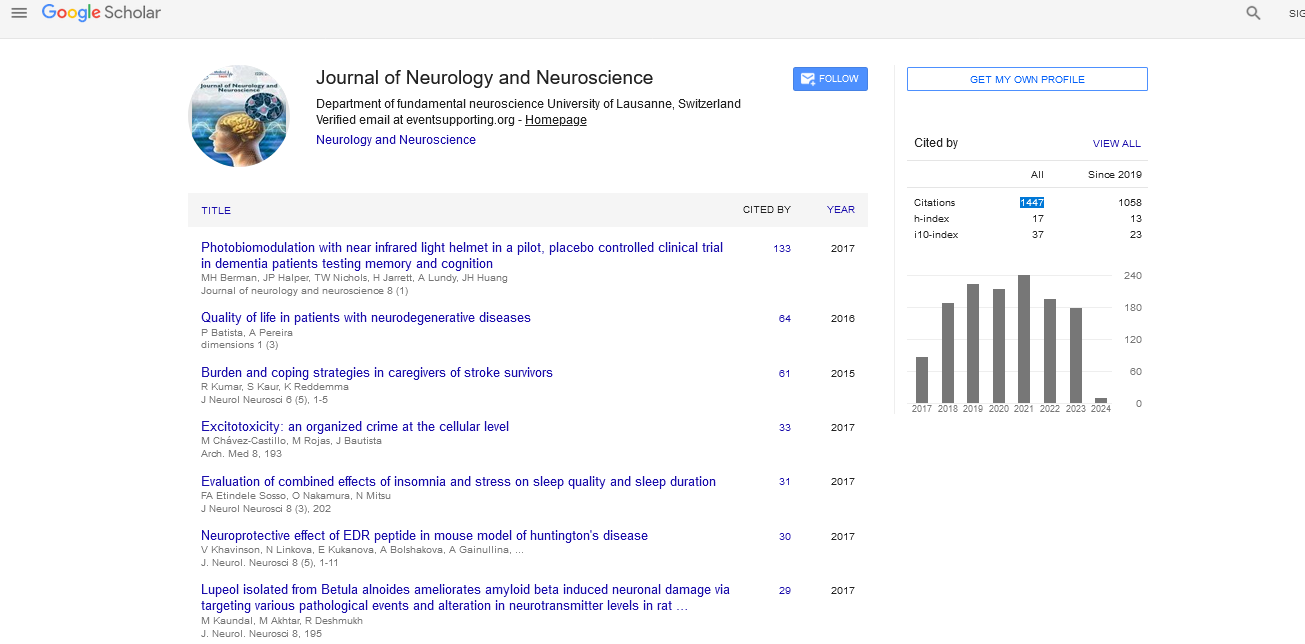Short Communication - (2024) Volume 15, Issue 5
Targeting neurotransmitter imbalances new approaches to mental health treatment
Keyoumars Ashkan*
Department of Health Sciecne, Aalborg University, 9220 Aalborg, Denmark
*Correspondence:
Keyoumars Ashkan, Department of Health Sciecne, Aalborg University, 9220 Aalborg,
Denmark,
Email:
Received: 03-Oct-2024, Manuscript No. ipjnn-24-15392;
Editor assigned: 05-Oct-2024, Pre QC No. P-15392;
Reviewed: 18-Oct-2024, QC No. Q-15392;
Revised: 24-Oct-2024, Manuscript No. R-15392;
Published:
31-Oct-2024
Introduction
Mental health disorders are increasingly recognized
as complex conditions involving not just psychological
factors but also biological underpinnings. Central to
these biological factors are neurotransmitters-chemical
messengers that transmit signals in the brain. Imbalances
in neurotransmitter systems can lead to a variety of mental
health issues, including depression, anxiety, schizophrenia,
and bipolar disorder. This article explores emerging
approaches to mental health treatment that target
neurotransmitter imbalances, examining both conventional
and innovative strategies to restore balance and promote
mental well-being.
Neurotransmitters such as serotonin, dopamine,
norepinephrine, and Gamma-Aminobutyric Acid (GABA)
play crucial roles in regulating mood, cognition, and
behavior. Serotonin is often linked to feelings of happiness
and well-being. Low levels of serotonin are commonly
associated with depression. Dopamine is involved in reward
and pleasure systems; imbalances can lead to conditions
such as schizophrenia and addiction. Norepinephrine
affects attention and responding actions; its dysregulation
is implicated in mood disorders and ADHD. GABA is
the primary inhibitory neurotransmitter, helping to calm
the nervous system. Low GABA levels can contribute to
anxiety disorders. Understanding these systems allows for
the development of targeted therapies that address specific
imbalances.
Description
Pharmacotherapy has been the cornerstone of
treatment for many mental health disorders. Selective
Serotonin Reuptake Inhibitors (SSRIs), for instance,
are commonly prescribed to enhance serotonin levels.
Similarly, antipsychotics target dopamine receptors to
manage schizophrenia. However, while these medications
can be effective, they often come with side effects and
may not work for everyone. Furthermore, they primarily
address symptoms rather than the underlying imbalances.
Psychotherapeutic interventions, such as Cognitive-
Behavioral Therapy (CBT), can help individuals cope with
mental health disorders by changing negative thought
patterns and behaviors. While beneficial, these approaches
do not directly address neurotransmitter imbalances.
Instead, they focus on psychological mechanisms, often
requiring a combination of therapy and medication for
comprehensive treatment.
Emerging research and treatment modalities aim to
more directly address neurotransmitter imbalances. These
approaches offer innovative ways to improve mental health
outcomes. Nutritional psychiatry explores the connection
between diet and mental health. Research has shown that
certain nutrients are crucial for neurotransmitter synthesis.
For instance: Omega-3 Fatty Acids: Found in fatty fish,
these acids have been linked to improved mood and
cognitive function. They play a role in neurotransmitter
signaling and can reduce inflammation in the brain. Amino
Acids: Precursors to neurotransmitters, amino acids such
as tryptophan (for serotonin) and tyrosine (for dopamine)
are essential for proper neurotransmitter function.
Dietary supplementation can support these pathways.
Micronutrients: Vitamins and minerals like B vitamins,
magnesium, and zinc are critical for neurotransmitter
production and overall brain health. A deficiency in these
nutrients can exacerbate symptoms of mental health
disorders.
Integrating a nutrient-rich diet or supplements can
help restore neurotransmitter balance and enhance mental
well-being. The gut-brain axis has gained attention in
recent years, highlighting the link between gut health and
mental health. Psychobiotics are a class of probiotics that
may influence mental health by modulating gut microbiota
and, consequently, neurotransmitter production. Some
studies suggest that certain strains of probiotics can
increase levels of serotonin and reduce anxiety. Research
into psychobiotics is still in its infancy, but the potential
for using gut health as a means of treating mental health
disorders is promising. Dietary changes, coupled with
probiotic supplementation, could offer a new avenue for
restoring neurotransmitter balance.
Mindfulness practices, including meditation and
yoga, have shown significant benefits in reducing
anxiety and depression. These techniques can influence
neurotransmitter levels and brain function. Mindfulness
meditation has been linked to increased serotonin and
dopamine levels, which can help mitigate symptoms of
depression and anxiety. Neurofeedback, on the other
hand, is a biofeedback technique that trains individuals
to alter their brain activity. By monitoring brain waves
and providing real-time feedback, individuals can learn
to self-regulate brain function. Research indicates that
neurofeedback can enhance neurotransmitter balance,
particularly GABA, leading to reductions in anxiety and
improvements in mood.
Transcranial Magnetic Stimulation (TMS) is a noninvasive
brain stimulation technique that targets specific
areas of the brain. TMS has been found to increase
dopamine and serotonin levels in individuals with
depression, offering a potential alternative for those
who do not respond to conventional treatments. TMS
works by using magnetic fields to stimulate nerve cells,
promoting neuronal activity and neurotransmitter release.
The treatment is typically administered in a series of
sessions and has shown positive outcomes in clinical trials,
making it a valuable tool in the mental health treatment
arsenal. Recent studies have highlighted the rapid-acting
antidepressant effects of ketamine, a dissociative anesthetic
that also has psychoactive properties. Ketamine is believed
to modulate glutamate levels, a neurotransmitter that
plays a key role in synaptic plasticity and mood regulation.
Unlike traditional antidepressants, which may take weeks to
show effects, ketamine can produce rapid improvements in
depressive symptoms. Furthermore, psychedelic substances
like psilocybin and MDMA are being investigated for their
therapeutic potential in treating PTSD and depression.
These substances have been shown to promote neurogenesis
and increase serotonin levels, offering hope for those with
treatment-resistant conditions.
Emerging research indicates that hormones and
neuropeptides may also play a significant role in mental
health. For instance, oxytocin, often referred to as the "love
hormone," has been shown to enhance social bonding and
reduce anxiety. Similarly, vasopressin may influence stress
responses and mood. Investigating hormonal therapies or
neuropeptide supplementation could offer new avenues
for addressing neurotransmitter imbalances, particularly
in individuals with conditions characterized by social
dysfunction or chronic stress. A holistic approach to
mental health treatment recognizes the interconnectedness
of body, mind, and environment. Integrating multiple
strategies—such as nutrition, exercise, mindfulness,
and pharmacotherapy—can provide a comprehensive
treatment plan tailored to individual needs. Lifestyle
modifications can significantly influence neurotransmitter
balance. Regular physical activity has been shown to
increase serotonin and dopamine levels, providing a natural
boost to mood. Sleep hygiene is equally important, as poor
sleep can disrupt neurotransmitter systems and exacerbate
mental health issues. Encouraging individuals to engage in
regular exercise, maintain a balanced diet, and prioritize
sleep can create a supportive foundation for mental health
treatment. Additionally, stress management techniques,
such as mindfulness and relaxation exercises, can further
enhance treatment outcomes [1-5].
Conclusion
As our understanding of neurotransmitter imbalances
deepens, so too does the potential for innovative mental
health treatments. While traditional approaches have laid
the groundwork for effective care, emerging strategies—
ranging from nutritional psychiatry to psychedelic therapyoffer
new hope for individuals grappling with mental
health disorders. By integrating these novel approaches
with established therapies, we can create more personalized
treatment plans that address the root causes of mental
health issues. The future of mental health treatment lies in
our ability to combine the best of both worlds-biological,
psychological, and holistic-to promote optimal mental
well-being. Continued research and collaboration across
disciplines will be essential in refining these approaches
and expanding access to effective treatments for all
individuals. As we move forward, the emphasis on targeting
neurotransmitter imbalances represents a significant step
towards a more nuanced and effective understanding of
mental health care.
Acknowledgement
None.
Conflict of Interest
None.
References
- Gore M, Brandenburg NA, Dukes E, et al. Pain severity in diabetic peripheral neuropathy is associated with patient functioning, symptom levels of anxiety and depression, and sleep. J Pain Symptom Manag. 2005; 30(4):374-385.
Google Scholar, Crossref, Indexed at
- Battelino T, Danne T, Bergenstal RM, et al. Clinical targets for continuous glucose monitoring data interpretation: Recommendations from the international consensus on time in range. Diabetes Care. 2019; 42(8):1593-1603.
Google Scholar, Crossref, Indexed at
- Hu P, Wang K, Zhou D, et al. GOLPH3 regulates exosome miRNA secretion in glioma cells. J Mol Neurosci. 2020; 70:1257-1266.
Google Scholar, Crossref, Indexed at
- Bréchet L, Brunet D, Birot G, et al. Capturing the spatiotemporal dynamics of self-generated, task-initiated thoughts with EEG and fMRI. Neuroimage. 2019; 194:82-92.
Google Scholar, Crossref, Indexed at
- Sheikh NA, Titone D. The embodiment of emotional words in a second language: An eye-movement study. Cogn Emot. 2016; 30(3):488-500.
Google Scholar, Indexed at





